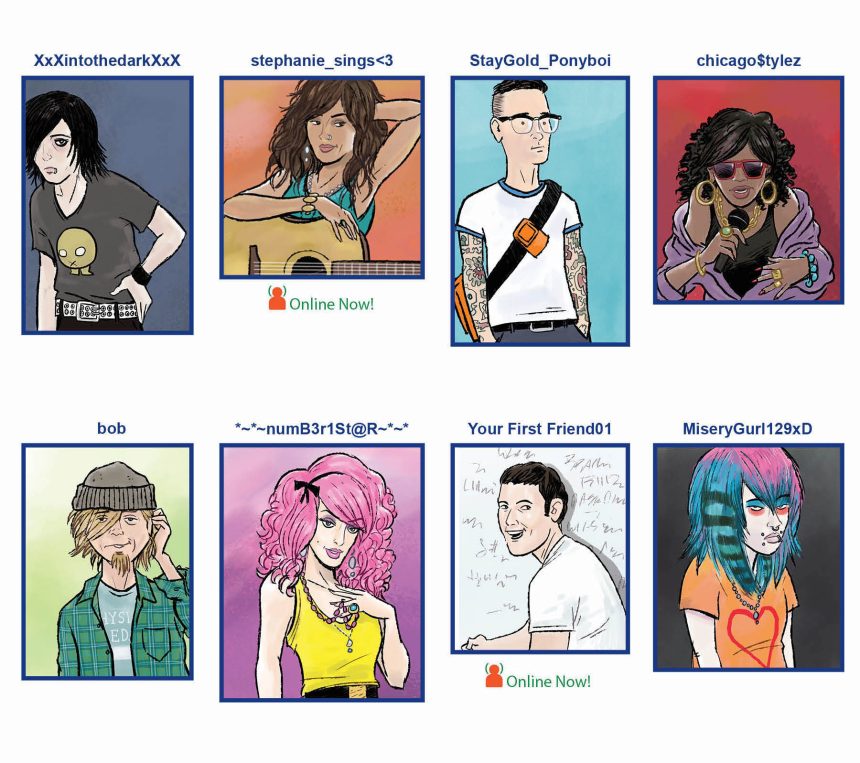Top Eight: How MySpace Changed Music’ is the new book by music journalist and author Michael Tedder. It’s available now, but to get a sneak peek, here is an excerpt about the intersection of Myspace and emo in 2003. Michael will be speaking with Rob Sheffield at Word on August 15 and August 17 at The Strand with Geoff Rickly of Thursday.
By June of 2004, MySpace had more than one million unique users per month. Unique is the operative term here, since people just couldn’t stop using the site to express themselves. While MySpace’s capacity for endless customization would eventually be one of the many headaches that would lead to the site’s downfall, for a while it was one of its most attractive features. As an added bonus, it gave many young people a crash course in how HTML worked, which likely cemented many a career path. Was MySpace’s default royal blue and white layout not doing it for you? You were free—encouraged even—to download code from sources such as Pimp-My-Profile.com and customize your page to your heart’s content.
We would soon achieve new levels of transcendent tastelessness. Do you want the background of your page to be the brightest hue known to man? Or are you more into stoner-friendly pictures of aliens? Do you want to make it so that your five favorite Avril Lavigne videos play at once when someone visits your page, resulting in an avant-garde cacophony of mall pop? Well, no one is stopping you, though someone probably should have.
Before he began rapping as Sir Michael Rocks, Antoine Reed was a Chicago high school student who wanted his MySpace page to look as fresh as the music he posted on it.
Eventually, he would confound the group the Cool Kids, a group that symbolized the way MySpace and blogs were overtaking, for a time, radio and MTV when it came to minting new hip-hop stars.
“I had a couple of different layouts. I was switching it often, depending on what the vibe was. For my background I had some stupid like stock samurai kind of images and then some little ninja guy,” he says. “I found out how to code a top 16 and a top 32 because too many people started feeling left out. It was starting to cause real friendship problems, man.”
One of MySpace’s greatest innovations is that it made finding new friends, new bands, and new scenes a real-life roleplaying game quest, with the hope that the end goal might be a favorite new song, a hookup, or increased social currency. Or all three, if it’s a good night.
There was a “Browse Users” function at the top of the page, so you could roll the dice and see if there was anyone else whose favorite book was Catch-22 or if there were any single people at your school who liked Radiohead and didn’t smoke. You could head over to the MySpace.com/music page to see what was popping in your favorite genre. Or you could wait for Sherwood to hit you up directly because you seemed cool.
There were plenty of musicians on MySpace from the beginning. But only some of them were of MySpace, a crucial distinction that your ears and heart could discern quicker than your higher cognitive functions. Only some artists embodied the confused, shy, horny, excited, lonely, weird, desperate-to-connect, throw-out-the-rules ethos of the era. At first, a lot of those artists and their fans were naturally from the emo world, because emo has always been concerned with both the need and struggle to bridge the insurmountable divide between you and the rest of the world, or even just you and the person next to you (very often the most difficult gap to close).
The emo scene and MySpace formed a connected loop. As one grew, so did the other. The more people who joined the site, the more they saw emo bands everywhere they looked, the more emo fans who joined because they’d heard the homeland had been discovered, and the bigger the site got. After years as a punch line and untouchable underground scene, emo was crossing over by the fall of 2003. The scene ran the Internet and quickly made MySpace its home base.
After releasing a series of cheaply recorded EPs and embarking on DIY tours, Motion City Soundtrack finished an early version of their debut I Am the Movie, which caught record label attention when a few tracks were posted to the industry music blog The Scout. Eventually, they would choose to go with the California punk label Epitaph. Founded by Brett Gurewitz of punk institution Bad Religion, the label broke huge in the ’90s thanks to the breakout success of the Offspring and Rancid, becoming the rare indie with a reach competitive with a major label.
“We had no management, nothing like that. I’m getting calls from Virgin and RCA and just endless people talking to us about our band,” says guitarist Joshua Cain. “We were seeing a shift that was driving this hunger for these bands. It was viewed as ‘this is going to blow up.’”
Released in the summer of 2003, I Am the Movie showed frontman Justin Pierre’s flair with nagging hooks and wordy nerd-play that tried to obscure some heavy shit. The album established them as the scene’s neurotic underdogs, an image cemented by the single “The Future Freaks Me Out.” Along the way, he adopted his signature punk Marge Simpson look, asking a friend “can you just fuck up my hair? He took the razor, he was just whacking at it. He was like, ‘Huh, none of those pieces look the same.’ And I was like, ‘That’s it, great.’”
Dashboard Confessional, Thursday and Saves the Day were all at make-or-break points in their careers by 2003, as emo was being touted as the biggest rock-based youth movement since rap metal, and these were considered the three most likely bets to go mainstream (or to collapse under the pressure and instead break up. Always a possibility, especially in this genre.). Some artists fared better than others during emo’s cultural moment. The Get Up Kids released the more energetic Guilt Show in 2004 and opened for Dashboard Confessional on a summer tour before going on extended hiatus. And after going through the major label ringer with MCA, a dispirited Midtown regrouped for one last try. It, uh, didn’t go so great.
Following a drawn-out fight with the Chicago-based hardcore label Victory Records and its owner Tony Brummel over money, creative control, and whoopie cushions, a financially damaged Thursday signed with Island Records, impressed with the label’s deep catalog (which included U2 and Bob Marley) and then copresident Lyor Cohen’s artist-friendly touch.
“Lyor Cohen was running Island and Def Jam together, and signed Jay-Z, Kanye West, and DMX and all these huge people. He suddenly became a huge fan of the band and was like, ‘You guys are what’s next. And whatever Victory can do to you, we’re gonna protect you from them, and if you think he’s powerful, wait till you see how powerful we can be,’” says Rickly. “Well, if we’re gonna be screwed by this guy, we better get more powerful friends that are gonna protect us from him.”
War All the Time pushed the soaring choruses even higher, but the dense song structures and Rickly’s poetic tales of America suffocation betrayed no signs of compromise.
If anything, Thursday used their mainstream platform to go even deeper, doubling down on the complex arrangements and minor-major dynamic shifts that set them apart from the pack, hitting with a force that showed these sensitive boys could subsume any meathead band out there. The title track was a panoramic view of Rickly’s childhood, recounting a friend’s death to suicide, finding salvation in music, and the generational loss of innocence after September 11, delivered over a heady guitar swell that shimmered with wounded strength.
The album was met with overall positive reviews, a solid Billboard debut, and decent airplay for the single “Signals Over the Air,” though it didn’t quite break as big as everyone was hoping for. “The label was telling us, ‘Yeah, you sold 80,000 records. But we have a monitoring service and they told us it was downloaded 325,000 times the first day it was on LimeWire,’” Rickly says. “So if there was no downloading, you would have a number-one record.’ I don’t know what they knew. It could also be just a really nice thing to say to a band.”
Saves the Day signed to DreamWorks Records and recruited Elliott Smith producer Rob Schnapf. In Reverie found Chris Conley taking his foot off the gas a bit to explore classic pop songcraft à la the Beatles and the Zombies, baffling an audience perhaps not familiar with the reference points and not at the point in their lives where they wanted to broaden their tastes just yet. (Maybe they should have waited until those fans were in college.) In Reverie would later become a fan favorite, but that’s cold comfort for an artist in the moment who just watched their ambitious step forward brick. They’d later return to a more mature version of their early sound, but mainstream rock stardom just wasn’t in the cards for them either.
Carrabba didn’t even have to sign to a major label to break through. Instead, Interscope increased its stake in Vagrant Records to 49 percent. Carrabba teamed with Foo Fighters and Counting Crows producer Gil Norton for A Mark, a Mission, a Brand, a Scar, a confident step forward that paid the haters no mind, as Carrabba was determined to be as sincere as he damn well wanted to be. It was an exercise in both smart songwriting and smart brand management, embracing just enough polish and full rock-band songs to earn new fans, but keeping enough brokenhearted ballads such as “Ghost of a Good Thing” to appease dayones worried that Dashboard Confessional might soon be everyone’s favorite band instead of their favorite band.
The hype around emo and Dashboard Confessional was so loud in 2003 that Carrabba appeared on multiple magazine covers, including two separate appearances on the cover of Spin in one year. The album debuted at number two on the Billboard chart, and bigger opportunities kept rolling in, including an MTV special wherein Dashboard Confessional covered R.E.M.’s classic album Automatic for the People, Michael Stipe dropped by to guest on a performance of the hit single “Hands Down,” and Honda Civic sponsored a headlining summer package tour.
In the summer of 2004, Dashboard Confessional were recruited for the Spider-Man 2 soundtrack, trading in the acoustic for beefy modern rock guitars. “Vindicated” was the band’s biggest hit yet, and Carrabba’s ascension to stardom was complete. Mainstream rock stardom was in fact in the cards for him. But he quickly realized that he didn’t like being famous all that much.
Meanwhile, the future world conquerors in My Chemical Romance wondered how people kept getting their phone number.
CHRIS CARRABBA (DASHBOARD CONFESSIONAL) : Losing privacy was really fucked up for me. Losing the ability to go to shows anymore and just stand in the audience without having to wear a baseball hat and a sweatshirt to cover my tattoos and stuff like that. I stood out like a sore thumb. And the demands on my time, and the lack of sleep, and the whole year with eleven days off, total.
It was just breakneck speed.
AMY FLEISHER MADDEN (FIDDLER RECORDS) : How did fame affect [Carrabba]? I don’t think it affected him. I think he stayed exactly the same. He’s always been a really smart businessman, and the only thing that I think was affected by his success is he became even sharper of a businessman.
MATT PRYOR (THE GET UP KIDS/THE NEW AMSTERDAMS): By the time Dashboard happened, it was just such a phenomenon. I’ve known Chris since 2001, and I can just shoot straight with him and just be like, “This is weird, dude.” And he’s like, “Yeah, it’s crazy.” And I’m like, “Do you want this? This is like a lot.”
CARRABBA: I really tried to make sure fame didn’t change me. I hope it didn’t make me worse in the moment. It was so exhausting that I wasn’t always at my finest, but I really had this strong intention of not letting it change me. If you’re trying that hard, it’s gonna have some results.
FLEISHER MADDEN: Chris and I . . . it was really confusing for us because we were best friends and tour buddies, and I was the label and he was the artist, which was no big deal when it was Fiddler and Dashboard. And things got very confusing when it was Vagrant and Dashboard, because there are a lot of things happening at Vagrant that I wasn’t really allowed to tell my best friend about. We took a decade-long break, I’d say.
JONAH MATRANGA (ONELINEDRAWING/FAR): I remember being around Chris as he blew up. At one point, he was on one of the Vagrant Tours and had a big bus, and there’s a big AT&T ad on it. He’s like, “Oh yeah, they just gave us the bus as long as we wrapped it in this banner.” I totally get that, and I would never, ever, ever, ever go in a fucking bus wrapped in an AT&T logo. Like, I just wouldn’t. And it’s not that I thought badly of Chris for doing it, I just realized that’s not me. I’ve always been a person that if I’m not going to make that choice then I shouldn’t expect to have that success.
PRYOR: When we were on tour with them in 2004, I remember sitting in the parking lot by the bus and he and I were just sitting and talking. And a bunch of kids had kinda gathered. We were in a recessed parking lot, and they were like above us on the street. And they just started taking pictures like a paparazzi almost kind of thing. And he seemed really annoyed by that. I was just like, “OK, if this is what you get when you win, I’m pretty happy with where I’m at.”
NORMAN BRANNON (TEXAS IS THE REASON): I mean, it’s funny because my rubric is still the same, which is just: “Are you real?” That’s the only thing I care about. And I can fucking sniff it a mile away when I listen to a band that’s not real. And it bums me out. But [Carrabba], he’s real. He’s grateful. He knows where he comes from, and he always pays it forward. That to me is the sign of a real one.
FRANK IERO (MY CHEMICAL ROMANCE: We had this lock-out practice studio where one of our friends was living there illegally and he had this phone put in and a bunch of bands just shared it, and they were calling this practice studio looking for some sort of representation to talk to for our band. It was like, “This is ridiculous, how is that even possible? There’s something way bigger than we could’ve imagined.” Is it someone’s job to troll MySpace and listen for new bands?
SCOTT HEISEL (ALTERNATIVE PRESS EDITOR): My wife worked for Victory Records. She was there the day the lawsuit came in from Hawthorne Heights.* I mean, Tony Brummel found creative ways to not pay bands who were the ones paying for everything else. You had your Taking Back Sunday, which is paying for the next fifty releases on that label. And then all those bands are all generating a little bit of money, but he’s constantly billing out and saying, we spent this money on promo, this money on marketing, so that nobody ever saw a royalty statement. It’s creative accounting, which Victory was masters of.
(* The Ohio band released their debut The Silence in Black and White on Victory and later sued the label.)
IERO: I definitely think that in the beginning, putting the band up on a social platform, having people listening to it and coming to shows and checking it out from there, that was the jumping-off point. I think there was a good three years of the band where we didn’t really have anybody else—it was just us, a few people at the label, our manager, our lawyer, and our booking agent, and that was it. Maybe seven people pushing the band.
RICKLY: We’ve got Victory telling us, “We’re gonna sell your contract, we’re gonna make sure you never put out another record again.” They’re very aggressively like, “We’re gonna ruin you.” Which I just couldn’t understand. We’re the biggest band on their label?
HEISEL: I never want to discourage anyone from exploring their creativity. I mean, the music industry’s been predatory since its inception. You look back to the 1950s and see examples of that. It’s always been about “how can we take advantage of these people and make as much money as we can?” And if you’re lucky, you’re creative and successful enough to then control your career down the line. That’s why bands would still sign to Victory Records, even knowing that every fucking band that succeeded on Victory Records sued them to leave. “Well, maybe we’ll get lucky enough to make enough money to sue them.” Which is insane. But that’s the music industry.
RICKLY: The head of Warner Bros. is flying to Albany to see us, all these A&R guys are coming out to every show and saying things, bringing cocaine, trying to get us drunk, just really trying to inundate us with the rockstar lifestyle, which was very anathema to what we’re interested in. But at the same time, we were only human, so we were like, “Yeah, I’ll try cocaine with you.”
SIMON: Thursday was of definite value to Alternative Press. Geoff Rickly provided a lot of credit to any artist or act he produced or did a feature with. Even when Thursday was up-and-coming, they still had this sort of wise air to them, that they were older and wiser than their years. And Geoff also was brutally honest about everything, for better or for worse. Which made him a great person to ask for any sound bite, because he had something to say about everything. When they signed to Island, and then Island started signing more up-and-coming bands, Thursday shepherded a lot of core values and ideas and—I don’t want to say strategies, but—approaches, maybe. The way that they did things would become a blueprint for how future bands did things.
RICKLY: Gary Gersh tried to sign us, and he was like, “You’re gonna be the next Nirvana. I know, I signed Nirvana.” And that was the only time we almost didn’t sign the Island Record shit. The guy who signed Nirvana says we’re gonna be the next Nirvana, that’s a big deal. And the A&R guy at Island had a very smart response: “He also told Jimmie’s Chicken Shack* they’re gonna be the next Nirvana.” That’s just your line. Of course, you use it on anybody you wanna sign up, come on.
MAX BEMIS (SAY ANYTHING): He did that to me too. We had smoke blown up our ass about being the next Nirvana.
(* A forgettable late ’90s funk-metal band from Annapolis, Maryland.)
IERO: All these bands were doing something and tapping into what the kids wanted to hear. I think it happens every ten years or so, someone says, oh, fuckin’ Minneapolis, Minnesota, is the new Seattle. And at that moment it was New Jersey is the new Seattle. And for such-and-such subgenre of whatever rock ’n’ roll music, and they put a fuckin’ tag on it, which eventually became emo or whatever the fuck they wanted to call it that week. It was like, oh this is a hotbed, so people just kind of went for it.
RICKLY: I was still a very innocent suburban kid, but there would be dinners where I realized later like, “Oh, was that person trying to set me up with Rihanna?” I hadn’t heard any music by her yet or anything, but I sat next to them at a table. I went to dip a dumpling in sauce and eat it, and the waiter was like, “That’s a finger bowl.” Whatever pop star that you’re bringing to introduce me to is not interested in this idiot who doesn’t even know what a finger bowl is.
IERO: I would say within a month . . . . I’m not sure if it happened to other bands around us, or just in that genre of music at the time, but we were playing basement shows. I remember we had a basement show in Philly one day, and Mike Gitter, he was the A&R for Roadrunner, showed up. It was like him and maybe ten other people, and one of them was a homeless guy with a tape recorder around his neck trying to sell us a bootleg of our show after the show. Those were the kind of things that were happening. It was very surreal, very weird, and we were aware of how strange it was and ran away from it as fast as we could.
JUSTIN COURTNEY PIERRE (MOTION CITY SOUNDTRACK): We were about six to eight years older than most of the bands we were touring with.
JOSHUA CAIN (MOTION CITY SOUNDTRACK): There was a lot of impostor syndrome going on in our lives. We would take ourselves super seriously, but we end up joking about stuff. Maybe it’s a defense mechanism. We think it’s funny when we’re self-deprecating, and maybe it’s not. When Brett took “The Future Freaks Me Out” to K-Rock,* they said we were a novelty band, because our lyrics were funny.
(* The Los Angeles radio station 106.7 KROQ was the main bellwether for alternative rock radio.)
PIERRE: I had something missing. There was a lot of self-hatred going on. I would prefer to get drunk and hide from everyone as much as possible whenever I could.
PRYOR: We had gone through this On the Wire experience, which was divisive both publicly and internally. Then it’s kind of this thing of like, “Should we double down on this or should we go back and make Something to Write About Home Part Two?” I was starting a family and I didn’t wanna go on tour, and then I got into a pretty good-sized darkness that I now know that I’m prone to do. [Guitarist Jim Suptic] referred to that record as our adult record, because there’s a lot of stuff about divorce, there’s a lot of stuff about death, there’s a lot of stuff about redemption. I can hear me wanting to leave in that record, not in the music, but in the words. And then around that time too is when things started falling apart for our band, just internally.
NATE HENRY (SHERWOOD): I think most local bands, they can’t figure out how to get out of town. I remember at the time us standing back and hanging out in the van and going, “Whoa, people in Seattle know who we are, this is crazy!” A year after our first EP came out that we had been promoting on MySpace and PureVolume, we ended up getting onto Warped Tour that summer in 2004.
PRYOR: I think going into Guilt Show, we were like, “we gotta make a rock record, we’re a rock band.” But at the same time, we were done with each other. I mean we weren’t fighting, but that whole record is assembled, we never played in the same room at the same time on that entire record. We started a band when we were children. Ultimately, we should have taken a year off or more, and because we weren’t mature enough to know that that’s something we could do, we broke up, and then took three years off, and then just got back together again. Which is why we all admit it was stupid.
GABE SAPORTA (MIDTOWN/COBRA STARSHIP): We’re just hitting reset. We’re twenty-two years old by then. We started Midtown when we were eighteen. It’s like a generation, when you’re that age. We were in a protracted legal negotiation to get off of Drive-Thru. And I think that actually strengthened our bond and made us think, We’re just going to make a record for ourselves. We don’t give a fuck. Our career is basically over unless we do this. Let’s just do something because we love it. And that was very inspiring for us and motivating, and we all worked really hard to make it happen. We’re literally rehearsing in my dad’s basement in Springfield, New Jersey, just recording and doing this stuff.
PRYOR: I remember having a conscious decision, sitting on the couch in my living room with my wife, who was very pregnant at the time, watching Saves the Day play on Conan or Letterman, and making a conscious decision not to be jealous and to be happy for my friends. I don’t want this to be a competitive sport. I’m very happy doing what we are doing and where we’re at, and if they surpass us, then I will be happy for them.
**
‘Top Eight: How MySpace Changed Music‘ is out now. Pick up a copy here to read the rest of the book. Catch author Michael Tedder speaking with Rob Sheffield at Word on August 15 and August 17 at The Strand with Geoff Rickly of Thursday.










